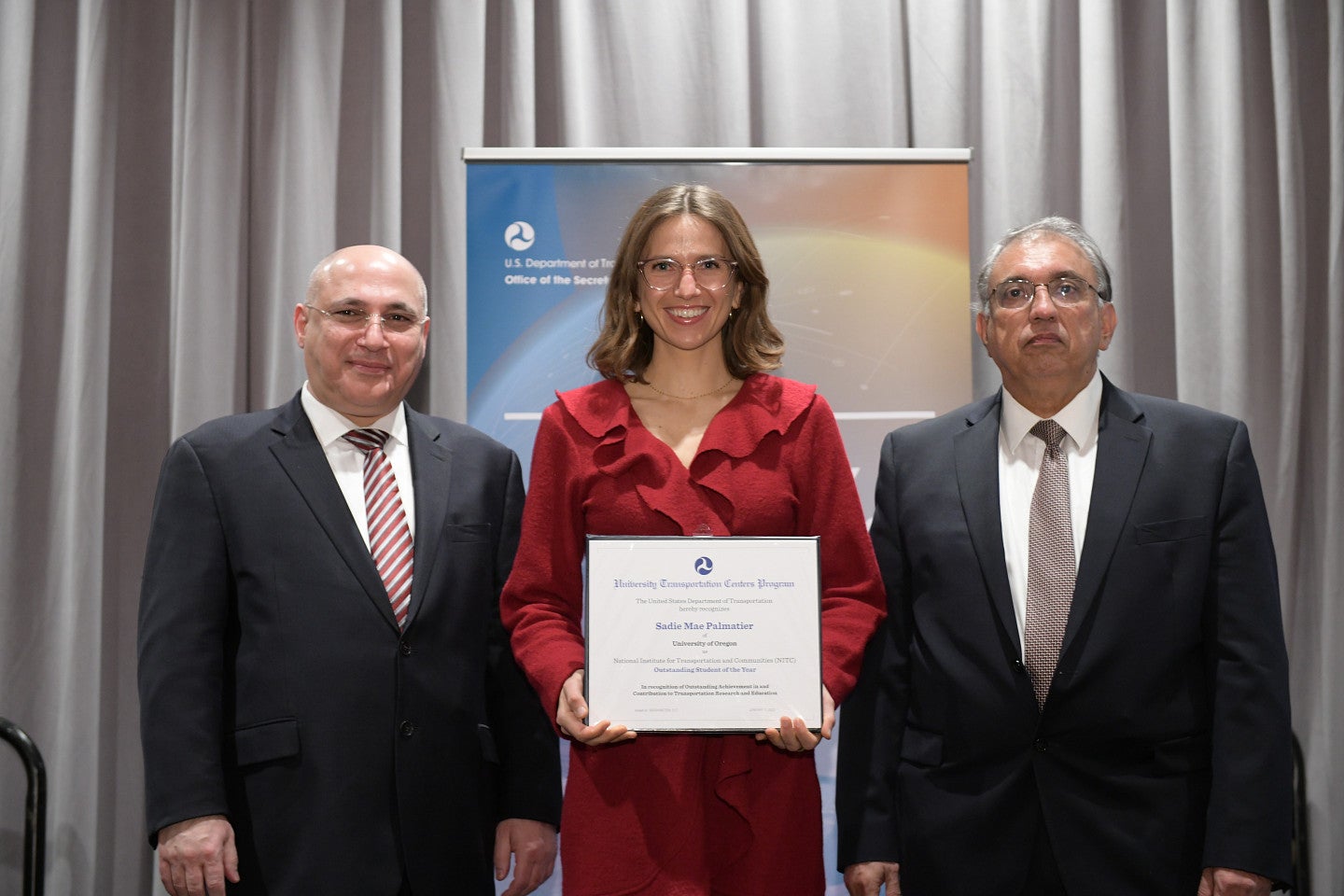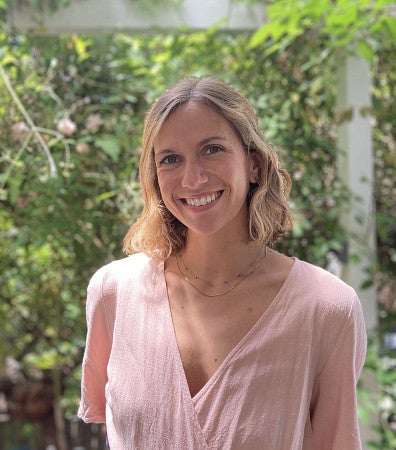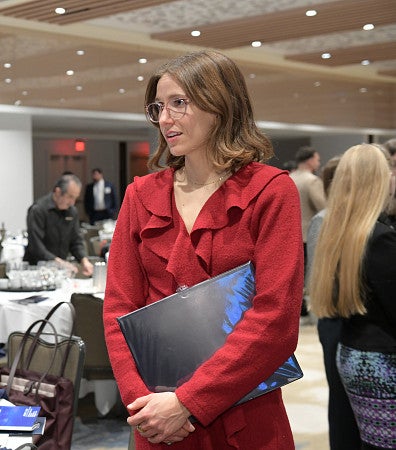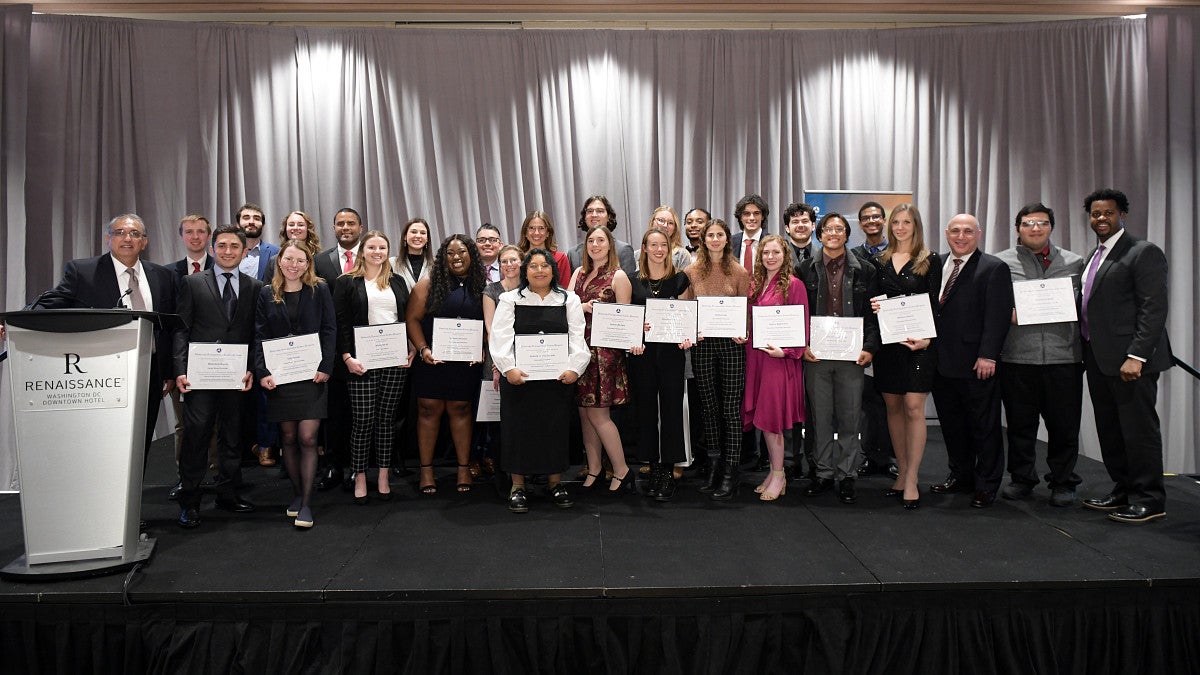
The Oregon Design Ducks (ODD) flock at the College of Design is made up of promising students, award-winning faculty, and passionate staff. The following profile is just one way our ODD flock is standing out and making its mark on the world.
Sadie Mae Palmatier is currently a graduate student in the School of Planning, Public Policy and Management (PPPM). Palmatier is working towards a master's degree in Community and Regional Planning. She is the 2021-2022 National Institute for Transportation and Community's Outstanding Student of the Year and a USDOT Dwight D. Eisenhower Transportation Research Fellow. Palmatier was selected to present her research at the highly prestigious Transportation Research Board annual meeting in Washington, DC. She currently serves as is the project manager for the Institute for Policy Research and Engagement. And, she's working to find solutions for lowering the housing costs through transportation policy.
The college and PPPM had an opportunity to catch up with Sadie Mae and learn about her experiences at the UO, what she's working on, and what is to come.
Here's what she had to say!
Why did you choose to earn a master’s degree in Community and Regional Planning? Was there a moment you remember that helped guide you toward this path?

Everybody comes to the field of planning in so very different ways. Some people come when they’re 20 years into their career, while others know before coming to college that this is what they want to do.
As for me, my undergraduate degree is in Environmental Economics and Ecology, so I was really focused on a conservation track. After finishing my undergrad [at Bates College in Lewiston, Maine], I worked in this field for a short time and realized I would be working seasonal jobs for the foreseeable future. For me, this path was not sustainable, so I pivoted to working in clean energy. I found myself feeling frustrated and a bit unfulfilled with this path. Something about this industry didn’t mesh with me. I was really removed from being involved in the work, which is something I had been directly involved with when doing conservation. I wanted to find my way back to that.
I remember having a conversation with one of my really trusted professors from undergrad. He asked me to describe something I liked about the nature of the work in one of my previous positions. After I described what I liked, he told me “That’s exactly what a planning process looks like, and there is an entire field that does that. They’re called Urban Planners.” I looked into this field and instantly recognized that planning encapsulates all the things I care about – climate change mitigation, equity, transportation, land-use issues, basically everything you see in a city. I realized that this really is what I want to do for the rest of my life! Once I got to that point, it was a clear and easy decision.
What led to your decision to choose the University of Oregon?
While I did go to school in Maine, I grew up out West. I moved back this way after finishing undergrad, so I knew I wanted to stay on this coast. While I was looking into planning and learning more about the field, I learned that Oregon has the strongest land-use planning system in the country and has had a very successful growth management program at the state-wide level. Coming from a place and having lived in many places that have experienced rapid population growth, I have seen first-hand the deleterious effects caused by a lack of planning and allowing sprawl. It was very attractive to me to attend a planning program in a place that has been thinking about this at a state-wide level. That was the original draw.
The other draw was learning about the work of my two advisors, Anne Brown and Rebecca Lewis. Knowing their expertise was something I would have access to and get to work with on a daily basis sealed the deal for me to come to the UO School of Planning, Public Policy and Management.
What would you say interests you most about Community Regional Planning, now that you’ve been able to study it in such depth?
This is an easy question and a hard question at the same time. It’s hard because the field of planning is so big and there are so many different directions you can go. I learn something every day that becomes the new “most interesting thing I’ve ever heard about.” However, one topic has remained consistent over my course of study. My focus is on the intersection of land use and transportation issues. Within that, I am writing my master’s thesis on issues of parking. While it may feel like it is just a part of our environment, it is inherently a land-use decision to dedicate valuable urban land to parking our 2,000-pound hunks of metal. That decision has serious implications on transportation outcomes and equity issues.
That’s one specific example of the concept that I’ve been especially interested in – land use and transportation intersect. Another example would be exploring a long-range transportation plan that looks at implementing public transit. This particular topic is also why I am so interested in the works of professors Rebecca Lewis and Anne Brown, who focus their research on land use and transportation, respectively.
In Fall ’22, you were named the National Institute for Transportation and Community (NITC) Outstanding Student of the Year! What did it mean to you to earn this title?
For context, NITC is a research consortium that the UO is a part of, and it is how many PPPM professors earn funding for transportation-related projects. Earning this was a really, really happy day for me. It’s a bit funny how it all came about. Honestly, I had no clue this was something that was even potentially coming down the pipe. One day my thesis advisor, Anne Brown, emailed by a very short message that said, “Please email me your latest CV. -Anne.” Of course, I did, but what I didn’t know is that she was nominating me for this award.
Finding out I had been recognized as the NITC Outstanding Student of the Year without knowing I’d ever been nominated was really validating to me – in part because I know I have a strong work ethic, but I also really care what it is that a study and the work I have done in practice. It felt like the recognition fit. I was overwhelmed and humbled by it, but it really was validation that I’m in the right field. What I like to do and what I’m good at doing are finally connecting and syncing up. It was such a great feeling.
Beyond the personal aspect, this also meant I got to attend the research conference in Washington, DC. Previously, I had submitted research I’d completed during the first year of my program to this conference, and I was accepted, but it was so expensive I didn’t think I’d be able to attend. This award paid my way to go! I got to be there and present my research. It was such a sweet and wonderful reward to earn this award and be able to attend this conference.
As you mentioned, over Winter Break you had the opportunity to present your research at the Transportation Research Board (TRB) annual meeting in Washington, DC. Can you tell us a bit more about that experience?

The TRB annual meeting is the transportation-related conference. If I remember correctly, about 13,000 people attended so it was a hugely overwhelming experience. Basically, everybody from every discipline involving transportation attends this conference – transportation engineers, people who make cement, people who focus on airplanes and rail travel, etc. It was very eye-opening to see the diversity of people who are in this field, and it was interesting to see that people focused on transportation policy are a rather small sector of the industry.
I was able to attend a lot of different sessions at this conference. There were sessions where researchers were presented on public transit, transit equity, and zoning code reform. The Department of Energy and Department of Transportation presented on electrification. Basically, every hot topic item you could imagine was being presented on. I was also fortunate enough to be able to share my research at two of my own poster sessions – one for the research I submitted that I mentioned earlier that, and another because I was selected to be the Dwight D. Eisenhower Transportation Fellow. It was a great experience where I was able to find kindred spirits – people who were excited to learn about parking because of the issues they face in their own cities. I talked to quite a few international folks, many from Switzerland and Germany, who were interested in the same issues we are facing domestically. Pairing their expertise with the research I had worked on shed new questions for myself, and once again validated that the questions I’ve been investigating are important, people care about them, and the outcomes might be significant. That was helpful to ground what can sometimes feel like an abstract field. Sometimes academia can be in one place, and it can be helping to bring it to a different setting.
I also had the opportunity to go on a field trip to the DC area’s Municipal Transportation System, WMATA. On the trip, DC transportation planners talked about the various fields and sectors they focus on within public transit planning. We were able to see all the different layers of what people can do and focus on within the field. Plus, the whole trip was just a full week of “nerding out” about this subject that I love. By the end though, I was a bit sick of being inside and the constant learning that I spent my last morning taking pictures of the beautiful townhouses and stunning architecture around Washington, DC! The whole experience was such a great time!
Can you tell us about the work you do as a project manager for the Institute for Policy Research and Engagement (IPRE)? Can you tell us about IPRE, your experience in this role, and the project you are working on?
IPRE is essentially a mini-consulting firm housed under PPPM. Its structure is unique in that it has faculty that work for IPRE who are practitioners rather than professors. Overall, IPRE’s bread-and-butter is working in hazard mitigation planning, but we work on tons of projects across the state of Oregon.
IPRE interacts with PPPM’s MCRP students by administering a 6-month, or 2-term, Community Planning Workshop (CPW) which is an experiential learning course for 1st-year master’s students. These students work together as a team to create a real-life planning project. I took CPW last year, and this year I’m serving as the project manager which is effectively the leader of this team. It’s a win-win for everybody. 1st-year students are getting actual planning experience early in their graduate program as opposed to waiting for a capstone project at the end of the program. Students are able to practice planning and apply then apply their learning throughout the rest of their degree.
As for me, I am learning to be a project manager in real time. I am learning how to manage and direct others’ time, and how to directly engage with a client which is incredibly helpful. My team is working on updating an economic development strategy for the Marion, Polk, and Yamhill counties. I started working on this project in September and was joined by the student cohort this January. None of us have focused on economic development in the past. In fact, there’s not really a focus on that in general for our program, but the handy thing about it is, it involves transportation issues, childcare, healthcare, housing, and everything that falls under the umbrella of planning. It’s just more focused on job creation and quality-of-life improvements as well. We are all learning a lot in this process – things like what we can and can’t control and what it’s like to be a consultant with intense involvement over a short period of time. In my case, I will graduate in June and my student team will move on to their next project. There is a lot of learning and a lot of reflection during and after this experience. Overall, it has been a fantastic experience for me and for the student team!
What is your goal once you’ve earned your master’s degree this June?
I have explored the option of further schooling and earning a doctorate degree, but I have committed myself to have at least two years of going out and being a planner before I will go back to school. I’ve set this rule for myself because, while academia is a safe space, it can be a very scary space at the same time. I know it’s something I’m good at which lends to the argument of continuing, but because planning is such an applied field, actually having the experience of being a planner outside of school may change the types of questions I might ask and the approach to research I might have.
I am really excited to graduate and start working in the field. I am scheduled to be a transportation planner while living in Oakland, CA, and working on a team based in Portland. I am really excited to have that kind of mix. I lived in the Bay Area for a while before coming to grad school and that was where I fell in love with the idea and the power of urban planning. I am really excited to go back to that community while still working “in the state of Oregon,” because it is a system I see value in, see the power of, and have a lot of personal interest in seeing that it continues to function well.
That’s the plan! I am very excited about it! I will be sad to leave this program though. I’ve benefited so much from this place, and I will miss so many aspects of earning this degree.
Tell us more about your master’s thesis! What would you like people to know about your research?
I have reflections on the research process in general – about how challenging it is and how rewarding it is at the same time. For my degree, a thesis is not required. It was something I elected to do because I had a question that nobody had answered yet. I decided I could be the one to answer it! Another big reason was the requirement of building parking every time something new is built takes away land that could be used for other things. In my area in particular, but also in urban planning overall, these decisions may seem insignificant but the effects of them or visible even right here in Eugene.
One of the things I learned in this research process is that we should question what is happening around us in the urban environment and ask ourselves why certain things are the way that they are. “Is there any research that shows that there could be a better path than what we are seeing?” I am still in the main phases of my research, but my central question is whether or not the elimination of minimum parking requirements in residential areas can lead to increased housing development. I will know more by May 30th when I present my thesis. I have just finished some of my statistical analysis, but I’d say what we do know is that parking makes housing more expensive. That is very important in a state where we have a significant housing shortage and need to build as fast as possible to house everybody that needs a home. There are of course ways to mitigate this. One example would be a parking garage built into structures that require fees to park in. A garage with this set-up would discourage driving, pay for the parking garage without tying their costs into rent or housing costs, and take up less usable land.
The main takeaways are: Research is hard. Question things in the urban environment. Parking makes housing more expensive, takes up valuable land, and contributes to people driving more. There is a better way, and the solution – purposefully analyzing zoning codes and seeing what kind of inefficiencies are created in them – could actually be relatively easy to solve.
What would you say to potential students who are considering studying Community and Regional Planning at the UO?
I think so highly about this program. I think the culture they’ve been able to create and continuously work on should be lauded. Somehow in this program, they have managed to make it so that school is a part of your identity, but it’s not your entire identity. What is especially valuable is the professors and faculty here see the students as people who are interested in planning, rather than just seeing us as planners. That allows for an understanding of how different elements of humanity – like being a young person or a mid-career professional coming back to school – can affect your perspective and you operate on a day-to-day basis. This mindset seems to often be absent from academic situations, and you are expected to drop everything for school and live and breathe it. In many situations, if that’s not you aren’t going to be valued. That’s not the case here. A lot is still expected from you in this program, but it’s expected in a realistic way, which I appreciate. I find it to be much more motivating than other, hyper-competitive situations which focus on personal gains between one another rather than working to accomplish a unified goal. In fact, my entire cohort has been amazing. We play trivia together every Wednesday night and when all else fails, that’s something that’s really fun for us to do together.
I’d also like to say that the professor support is fantastic and very accessible. I went to a small liberal arts college and if I could point to one thing that benefited me in earning my degree, it’s how often I was able to interact with professors and how much they made it apparent that they cared about me and my endeavors. The same is absolutely true in this program. I’ve not found ego to ever be something that gets in the way, which is not something that can be said about a lot of the schools that I looked at. It’s been a wonderful experience to get to learn from so many types of professors from so many fields that have supported me from the start. My interests have been celebrated in a way that’s never happened to me before. It has all been extremely valuable and it’s not something I take for granted.

